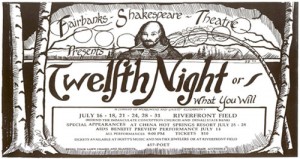About Us 
The mission of Fairbanks Shakespeare Theatre is to provide high-quality Shakespearean and classical theatre productions; to actively contribute to the Fairbanks arts community; to deepen appreciation of, and expand and diversify the audience for, Shakespearean and classic theatre in Interior Alaska, particularly among young people; to encourage and support young people in performing Shakespeare; and to build the capacity of Alaskans to perform Shakespeare and classical theatre.
Since an initial 1992 performance alongside the Chena River in downtown Fairbanks, the Fairbanks Shakespeare Theatre has grown into a year-round producing and international-touring theatre company. FST has expanded beyond summer performances to include outreach to Boys’ and Girls’ clubs, assisted-living residences, correctional facilities, homeless shelters, and youth detention centers, as well as countless performances for K-12 students throughout Alaska. The cornerstone of FST’s education and outreach program is "Bard-a-Thon," a 24-hour-a-day, weeklong reading of the complete works of Shakespeare. Since 2000, this free event has drawn hundreds of people together during the cold Alaskan winter to give voice to Shakespeare’s words.
Fairbanks Shakespeare Theatre is proud to be a member of The Shakespeare Theatre Association (STA). For more information visit http://www.stahome.org/fairbanks-shakespeare-theatre. STA was established to provide a forum for the artistic, managerial, educational leadership for theatres primarily involved with the production of the works of William Shakespeare; to discuss issues and methods of work, resources, and information; and to act as an advocate for Shakespearean productions and training. |